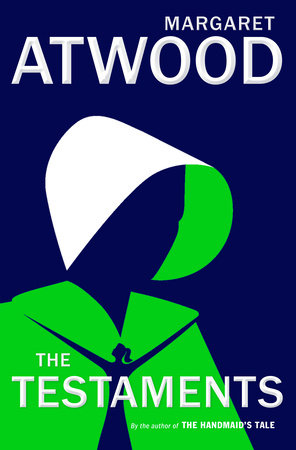The Testaments by Margaret Atwood
Chatto & Windus
Pp. 415
In her acknowledgements, at the end of The Testaments, Margaret
Atwood thanks “the readers of The Handmaid’s
Tale; their interest and curiosity has been inspiring.” If my desire to
know what happened after The Handmaid’s
Tale is in any part responsible for the writing of this book, 35 years after
its predecessor, you’re welcome. It’s been a long time coming, but it is
certainly worth it, and after all this time, it still has a clear directive: “We
must continue to remind ourselves of the wrong turnings taken in the past so we
do not repeat them.”
Much of the novel is a thinly-veiled polemic against
totalitarianism. One of the narrators is Aunt Lydia, who warns against assuming
all that is new is good, and ignoring past wisdom, especially that derived from
women. “The corrupt and blood-smeared fingerprints of the past must be wiped
away to create a clean space for the morally pure generation that is surely
about to arrive. Such is the theory.” She keeps a secret diary, which is part
confession, within the hollowed-out pages of a book, incorporating sarcasm about women’s perceived roles with asides
about the veracity of history and the stories we are conditioned to believe.
Her wit and humour are displayed throughout her manuscript,
and she
rambles with her folksy sayings and pragmatic methods. There is a dark side to
the humour, however. Some of the young girls threaten to will kill themselves
if they are forced into marriage, afraid of male sexuality. “No one wants to
die. But some people don’t want to live in any of the ways that are allowed.” It
is horrifically symptomatic of totalitarian regimes: women and children suffer
as men rape and take what they want.
Before Gilead,
Lydia was a judge, and the new (male) rulers did not want her around. “Any
forced change of leadership is always followed by a move to crush the
opposition. The opposition is led by the educated, so the educated are the
first to be eliminated.” Persecution was fairly indiscriminate: “All that was
necessary was a law degree and a uterus: a lethal combination.” Now she is a
cornerstone of the Gilead government, but she knows power can be overthrown and
statues easily toppled.
Whereas The Handmaid’s Tale was focused primarily
on June and the other handmaids and was claustrophobic in tone; this novel is
narrated through three different voices: Aunt Lydia, Agnes, and Daisy. As the
title suggests, they are putting their name to a document they have sworn to be
true, and the novel opens up into a wider world. Where there are women; there
is communication. “The Aunts, the Marthas, the Wives: despite the fact that
they were frequently envious and resentful, and might even hate one another,
news flowed among them as if along invisible spiderweb threads.”
Treatment of women by men, who seek to dominate and oppress
them, is an over-arching motif. Women must be pure: those who enjoy sex
and physical relationships are sluts. Women should be nurturers and carers. Women
are blamed for their indiscretions; men are not held accountable for their deeds:
men must act on their urges; women must not encourage them. Women exist to
reproduce; their bodies are baby-making factories and do not belong to them
individually. “Every woman wanted a baby, said Aunt Estée. Every woman who wasn’t
an Aunt or a Martha. Because if you weren’t an Aunt or a Martha, said Aunt
Vidala, what earthly use were you if you didn’t have a baby?” It’s all
depressingly familiar.
Aunt Lydia keeps
secrets so she can blackmail people later when it is useful to do so. “All that
festers is not gold, but it can be made profitable in non-monetary ways:
knowledge is power, especially discreditable knowledge. I am not the first
person to have recognised this, or to have capitalized on it when possible:
every intelligence agency in the world has always known it.” Fake news and
students on strike are recognisable tropes. The combination of adulterated
Shakespeare and pertinence to contemporary affairs is deliberately unsettling. Atwood
uses the language of fairy tales, but the chilling ones like Sleeping Beauty and later comparisons
with Bluebeard.


No comments:
Post a Comment